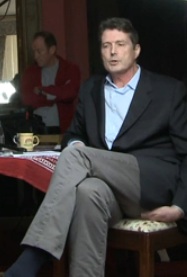 Producer Marcela Gaviria and producer/correspondent Martin Smith, who both worked on the FRONTLINE "WikiSecrets" documentary that aired last night, and Brian Manning, Bradley Manning’s father, participated in an online PBS chat that offered people an opportunity to ask questions and make comments about the film.
Producer Marcela Gaviria and producer/correspondent Martin Smith, who both worked on the FRONTLINE "WikiSecrets" documentary that aired last night, and Brian Manning, Bradley Manning’s father, participated in an online PBS chat that offered people an opportunity to ask questions and make comments about the film.
Gaviria/Smith suggest the prosecution in the Manning case is “quite strong” and investigators have “matched Manning’s computer to [computer hacker Adrian] Lamo’s, verifying the authenticity of the chats.” Gaviria/Smith add, “To be acquitted Manning’s lawyer would somehow have to prove that Manning had been framed and his computer had been tampered with.”
This focus on Lamo overlooks a key legal dilemma that has risen as a result of President Barack Obama declaring at a fundraiser that Manning “broke the law.” That's the issue of “unlawful command influence."
Whether Manning could have a fair trial now that the Commander-in-Chief has told his subordinates he thinks Manning is guilty is doubtful. A military officer would be risking his career if he or she handed down a decision that did not meet the approval of the Obama Administration. Gaviria/Smith are seemingly oblivious to this when they type their answer.
Asked why the documentary overplayed Manning’s homosexuality, Gaviria/Smith explain, “Manning’s homosexuality is not relevant. What is relevant was his struggle with the Army’s Don’t Ask/Don’t Tell policy. It eroded his respect for Army authority and led to disillusionment with Army life. It’s not that he was gay, it was that he was discriminated for being gay.”
 Anyone familiar with the stories of WikiLeaks, Julian Assange, the organization’s founder and Pfc. Bradley Manning, the alleged whistleblower to WikiLeaks, would be forgiven for wondering whether PBS Frontline’s documentary “WikiSecrets” presents anything new or not. The documentary attempts to make a sensational connection between Manning and Assange and suggest that Assange might know Manning is the source of the information.
Anyone familiar with the stories of WikiLeaks, Julian Assange, the organization’s founder and Pfc. Bradley Manning, the alleged whistleblower to WikiLeaks, would be forgiven for wondering whether PBS Frontline’s documentary “WikiSecrets” presents anything new or not. The documentary attempts to make a sensational connection between Manning and Assange and suggest that Assange might know Manning is the source of the information.
The Story
PBS FRONTLINE documentaries are typically straightforward. Thus, the opening montage provides a good idea of what the main points of the documentary will be: it’s hard to tell if Manning approached Assange or whether Assange approached Manning, WikiLeaks had feared one of its “sources” would be exposed, the chat logs suggest Manning knows Assange (but Assange denies that) and WikiLeaks is an anti-secrecy organization that doesn’t believe in secrets, which is why over half a million documents were leaked.
In the first act, FRONTLINE attempts to psychoanalyze Manning and make a determination on his mental health. Sordid details are presented leading one to understand that Manning found himself to be smarter than most of the other soldiers in the military. He was gay and had no respect for “Don’t Ask, Don’t Tell.” He was using Facebook in a way that put him at risk. He was incapable of keeping a steady job. He was a vocal person and had little respect for his commanding officers. And, an army supervisor did not find him to be fit to go to Iraq.
Theme by Danetsoft and Danang Probo Sayekti inspired by Maksimer